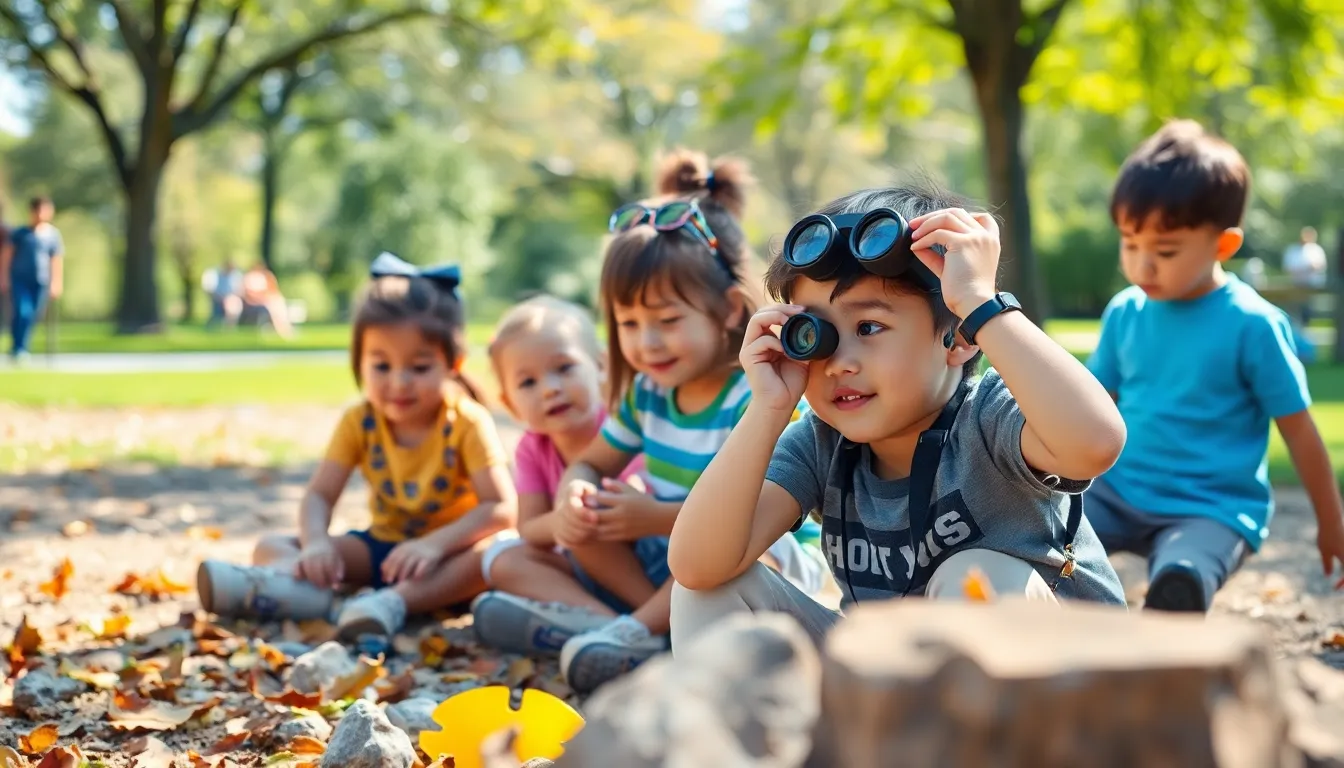In a world where traditional play often takes center stage, Montessori play ideas offer a refreshing approach that nurtures creativity and independence. Rooted in the belief that children learn best through hands-on experiences, these activities engage young minds while promoting essential life skills.
Montessori play encourages exploration and discovery, allowing children to learn at their own pace. By incorporating everyday materials and open-ended tasks, these ideas inspire curiosity and foster a love for learning. Whether it’s through sensory bins or practical life activities, Montessori play transforms ordinary moments into extraordinary opportunities for growth.
Table of Contents
ToggleUnderstanding Montessori Play Ideas
Montessori play ideas focus on child-centered learning that encourages autonomy and exploration. These concepts stem from the fundamentals of Montessori education, emphasizing hands-on activities that engage children actively in their learning processes.
Principles of Montessori Education
- Child-Centered Approach: Montessori education respects individual learning styles and paces. Each child engages with materials that resonate with their interests or curiosity.
- Prepared Environment: Montessori settings offer an organized, accessible environment. Children find a range of stimulating materials that promote exploration and learning.
- Freedom of Choice: Children select their tasks, fostering independence. They develop decision-making skills by pursuing activities that captivate their attention.
- Structured Learning: Although children engage freely, Montessori education incorporates clear structures. This balance enables children to navigate choices while following a purposeful learning path.
- Hands-On Learning: Montessori play employs tactile materials. Children learn concepts by manipulating objects, enriching their understanding through physical interaction.
Benefits of Play in Montessori Learning
- Encourages Exploration: Play in Montessori settings promotes curiosity and investigation. Children explore their interests deeply, leading to a greater understanding of their environment.
- Fosters Independence: Engaging in self-directed activities builds confidence. Children learn to take initiative and responsibility, enhancing their sense of autonomy.
- Enhances Problem-Solving Skills: Montessori play allows children to tackle challenges creatively. They devise solutions through trial and error, sharpening critical thinking abilities.
- Boosts Social Skills: Collaborative play nurtures communication and teamwork. Interactions with peers during shared tasks foster social awareness and empathy.
- Promotes Cognitive Development: Engaging with diverse materials stimulates cognitive growth. Children develop thinking, reasoning, and understanding through meaningful play experiences.
Creative Montessori Play Ideas

Montessori play ideas spark creativity and support independence. Engaging children with various activities enhances their learning experiences both indoors and outdoors.
Indoor Montessori Activities
- Sensory Bins: Fill bins with rice, beans, or sand. Incorporate scoops, cups, and small toys to encourage exploration and fine motor skills.
- Practical Life Tasks: Set up stations with everyday tasks, such as pouring water, buttoning clothes, or folding napkins. These help develop self-care skills and coordination.
- Art Stations: Provide diverse materials like crayons, paint, and scraps of paper. Allow children to express themselves freely without specific guidelines.
- Building Blocks: Use wooden blocks or building sets to encourage spatial awareness and engineering skills. This promotes creativity as children construct their own designs.
- Nature Exploration: Collect leaves, flowers, or stones. Encourage children to examine and sort these natural items, linking science and art through observation.
Outdoor Montessori Experiences
- Gardening: Involve children in planting seeds, watering plants, and observing growth. Gardening teaches responsibility, biology, and patience.
- Nature Walks: Organize walks to observe local flora and fauna. Encourage children to document their findings through drawings or simple journaling.
- Outdoor Obstacle Courses: Create courses using natural elements like logs, rocks, or climbing structures. Such activities enhance gross motor skills and encourage imaginative play.
- Birdwatching: Provide binoculars and a field guide. Children observe birds in their natural habitats, promoting curiosity about wildlife and ecosystems.
- Play Stations: Set up various play areas with different materials, like sand, water, or tires. Each station fosters creative play and encourages cooperative interactions among peers.
Incorporating Montessori Play Ideas at Home
Creating a Montessori-inspired environment at home encourages exploration and autonomy. Structured spaces with accessible materials foster independent play and learning.
Setting Up a Montessori Environment
Establishing a Montessori environment involves organizing spaces that promote independence and exploration. Designate specific areas for different activities. Create a reading nook filled with age-appropriate books. Set up a practical life corner with tools for everyday tasks, such as pouring, sweeping, and folding. Ensure low shelving displays materials within reach, allowing children to select and return items freely. Use soft colors and natural materials to cultivate a calming atmosphere, which can enhance focus and creativity.
Choosing the Right Materials
Selecting suitable materials plays a crucial role in Montessori play. Focus on open-ended toys that encourage creativity, like building blocks, art supplies, and sensory materials. Incorporate everyday objects, such as measuring cups, kitchen tools, or natural items, for hands-on experiences. Prioritize quality over quantity; fewer, well-chosen items provide more meaningful learning opportunities. Ensure materials are developmentally appropriate, engaging children’s senses and inspiring curiosity. Use simple, safe, and durable items that align with interests and skills to enhance the Montessori experience at home.
Community Resources for Montessori Play
Community resources enhance Montessori play by connecting families and providing access to valuable support systems. Engaging with local and online groups offers opportunities for collaboration and shared learning experiences.
Local Montessori Groups and Playdates
Local Montessori groups and playdates create supportive networks for families. These groups often organize events, workshops, and outings, enabling children to engage in Montessori activities together. Participants can share resources, tips, and experiences that enrich the learning environment. Families benefit from the chance to form friendships while their children explore independent play with peers. Joining such groups strengthens community ties and enhances the Montessori experience.
Online Montessori Communities
Online Montessori communities serve as platforms for parents and educators to connect and exchange ideas. These virtual spaces provide access to a wealth of resources, including activity guides, articles, and forums for discussion. Members can share insights, ask questions, and support one another in implementing Montessori principles at home. Online groups often feature workshops, webinars, and virtual playdates, broadening participation beyond geographical boundaries. Engaging in these communities fosters collaboration and ensures continuous growth in understanding Montessori philosophies.
Embracing Montessori play ideas can transform a child’s learning journey into an exciting adventure. These activities not only encourage independence but also spark creativity and curiosity. By integrating hands-on experiences into daily routines, children can explore and discover at their own pace.
Creating a Montessori-inspired environment at home or within the community further enhances these benefits. It fosters a love for learning and allows children to engage meaningfully with their surroundings. As families and educators connect through local and online resources, they can share valuable insights and support each other in nurturing the next generation of curious and capable learners.



